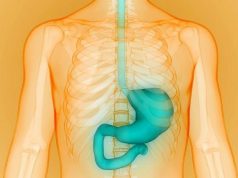Lower risk for ischemic events and death outweigh risk for another bleeding event
TUESDAY, Oct. 29, 2019 (HealthDay News) — Patients who restart their blood thinners after a gastrointestinal bleed have a lower risk for dying within the next two years even though they have a higher risk for recurrent gastrointestinal bleeding, according to a study recently published in Alimentary Pharmacology and Therapeutics.
Carlos Sostres, M.D., from the Hospital Clínico Universitario Lozano Blesa in Zaragoza, Spain, and colleagues determined the rates of rebleeding, vascular events, and death in patients treated with antiplatelet or anticoagulant agents who developed major gastrointestinal bleeding.
The researchers found that among 871 patients (mean age, 78.9 years), 38.9 percent used an anticoagulant agent, 52.5 percent used an antiplatelet agent, and 8.6 percent used both. The vast majority (93.1 percent) interrupted treatment after gastrointestinal bleeding, but 80.5 percent restarted therapy within 7.6 days. During a median follow-up of 24.9 months, resumption of both therapies was associated with a higher risk for rebleeding, lower risk for ischemic events or death, and a similar risk for upper and lower gastrointestinal events. A similar pattern of rebleeding was seen with resumption of therapy no more than seven days after bleeding. In patients treated with anticoagulant agents, rebleeding rates were higher than in patients taking antiplatelet agents (138.0 versus 99.0 events per 1,000 patient-years). In 61.8 percent of cases, the rebleeding location was identical.
“Our study provides information to balance the risks and benefits of the global management of these two pharmacological groups of drugs widely associated with increased gastrointestinal bleeding risk,” the authors write.
Several authors disclosed financial ties to the pharmaceutical industry.
Copyright © 2019 HealthDay. All rights reserved.








